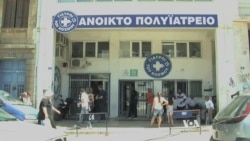As Europe’s politicians debate the future of Greece in the eurozone, the economic arguments seem distant for many Greeks living in poverty. Five years of government spending cuts have had a huge impact on public services, and it’s likely EU leaders will demand further austerity in return for a bailout deal.
One does not have to look far for those most affected by the crisis. The waiting area at a free clinic run by Doctors of the World in Athens is a cross-section of Greece’s poorest: the homeless, the elderly, the unemployed, alongside dozens of immigrants who have landed on Greek shores.
Inside the clinic, volunteer doctors and dentists treat everyone, no questions asked. But their resources are limited, and they are struggling to cope.
Dr. Bettina Krumbholz says the health system started to crumble when the debt crisis began in 2008.
“We used to have a very good system, and it really used to work quite efficiently. But after they had to fire so many doctors, the system got very poor. There’s a lack of nurses, there’s a lack of doctors. So the people, they’re waiting for 10, 12, even more hours in line,” she said.
Krumbholz says the restrictions on cash withdrawals over the past two weeks have made the situation worse.
“They don’t have money to get the medicine. So we have even many Greek patients that come here only to get their medication," she said. "We cannot leave people dying on the streets, out of hunger, out of lack of medicine, out of lack of doctors.”
‘Solidarity’
"Solidarity" is the battle cry of Greeks who fight the crisis by offering their services for free – for health care, legal advice, food.
In Athens’ central Monastiraki Square, in the shadow of the Acropolis, 51-year-old Konstantinos Polychronopoulos stirs a large pot of chicken stew as other volunteers ready plates and cutlery at the self-styled "Social Kitchen."
Polychronopoulos lost his job as a marketing executive four years ago, and was told repeatedly at interviews that he was too old or overqualified. He now offers free meals to anyone, rich or poor.
“I started the ‘social kitchen’ when I saw two small boys having a fight over a piece of food in front of a garbage dump,” he said. “This did not bother me so much. What bothered me more was the fact that people were passing by without showing any interest, acting like they did not see it.”
Even if there is a bailout deal, the economic hardship will continue for many Greeks, the victims of a debt crisis that has taken a huge toll on the nation’s poorest.





